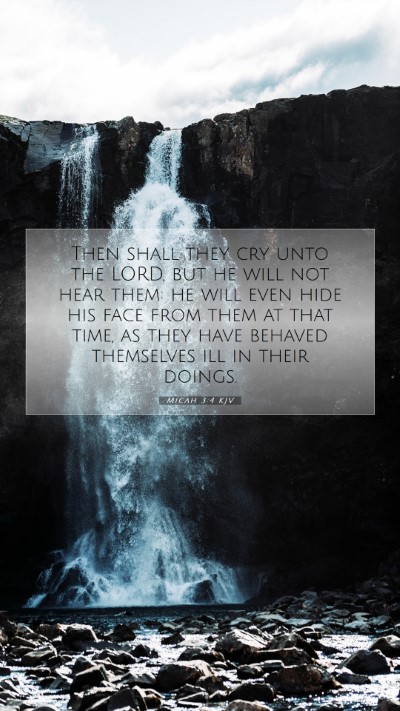Old Testament
Genesis Exodus Leviticus Numbers Deuteronomy Joshua Judges Ruth 1 Samuel 2 Samuel 1 Kings 2 Kings 1 Chronicles 2 Chronicles Ezra Nehemiah Esther Job Psalms Proverbs Ecclesiastes Song of Solomon Isaiah Jeremiah Lamentations Ezekiel Daniel Hosea Joel Amos Obadiah Jonah Micah Nahum Habakkuk Zephaniah Haggai Zechariah MalachiMicah 3:4 Meaning
What is the meaning of Micah 3:4?
Then shall they cry unto the LORD, but he will not hear them: he will even hide his face from them at that time, as they have behaved themselves ill in their doings.
Micah 3:4 Bible Verse Meaning
Understanding Micah 3:4 - A Comprehensive Commentary
The verse Micah 3:4 serves as a poignant reminder of the consequences faced by those who fail to heed the divine call for justice and righteousness. This commentary integrates insights from renowned public domain authors such as Matthew Henry, Albert Barnes, and Adam Clarke to provide a thorough exploration of this scripture. Here we delve into its meanings, interpretations, and applications, helping those seeking clarity on Bible verses to gain a comprehensive understanding of this pivotal passage.
Bible Verse Text
Micah 3:4 (KJV): "Then shall they cry unto the Lord, but he will not hear them: he will even hide his face from them at that time, as they have behaved themselves ill in their doings."
Verse Meaning and Insights
Contextual Analysis: Micah, a prophet of justice, addresses the issues prevailing in Israel with a focus on the corrupt practices of leaders and false prophets. The historical context highlights a time of moral decay where leaders exploited their positions at the expense of the vulnerable.
- Matthew Henry's Commentary: Henry emphasizes the futility of seeking divine assistance after neglecting righteousness. The verse serves as a warning that God’s silence is a response to persistent sin.
- Albert Barnes' Commentary: Barnes notes the progression of unfaithfulness. This abandonment of divine laws leads to a time when seekers of God will find Him unresponsive—depicting the dire consequences of disobedience.
- Adam Clarke's Commentary: Clarke explains the metaphor of God hiding His face as a sign of disfavor. This implies a severance of fellowship, highlighting the severity of turning away from true justice and godliness.
Theological Implications
This verse not only speaks to the individual but also portrays the broader community's moral standing before God. It urges an introspective examination of how one's actions align with God's character and commands.
- Consequences of Sin: Failure to adhere to a righteous path leads to desolation in one's spiritual relationship with God.
- God's Justice: The hidden face of God reflects His response to injustice, serving as a reminder that divine assistance is linked to obedience.
Application in Modern Life
This passage prompts readers to reflect on their lives and communal responsibilities. The understanding of scripture encourages a pursuit of righteousness, which can have profound implications for personal and communal faith practices.
- Engaging in Justice: Believers are called to engage actively in social justice, ensuring that their actions are reflective of God’s nature and word.
- Spiritual Vigilance: The necessity of repentance and continuous examination of one’s life in relation to God’s expectations is vital.
Cross References
Related scriptures that echo similar themes include:
- Isaiah 59:1-2: Discusses God's readiness to help but highlights that sin creates barriers to His assistance.
- Jeremiah 14:12: Explores the futility of seeking God’s help amidst persistent rebellion.
- Psalm 66:18: Points out the relationship between unconfessed sin and God's refusal to hear prayers.
Conclusion
Micah 3:4 provides deep insights into God's nature and expectations from His people. When seeking the meanings of Bible verses such as this, it is essential to combine careful exegesis with practical application to cultivate a life aligned with biblical teachings. This passage stands as a call to faithfulness and a robust reminder of the importance of seeking righteousness in both individual and communal contexts.
For those in Bible study groups, use this commentary as a resource for discussions on justice, divine silence, and moral integrity. It is also beneficial for online Bible study sessions or for personal meditation and reflection on how to apply scripture to daily life.
Further Study Suggestions
Consider exploring:
- How to interpret Bible verses with other passages concerning divine judgment and grace.
- In-depth Bible verse analysis related to other Old Testament prophets.
- Historical context of Bible verses focusing on the socio-political climate during Micah's time.


